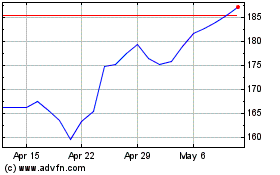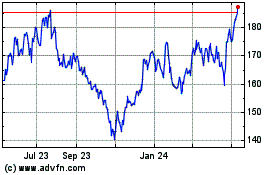Intel Should Embrace Rival's Chip Design - Analyst
April 18 2011 - 1:31PM
Dow Jones News
Intel Corp. should embrace the technology of rival ARM Holdings
PLC to strengthen its position in the mobile-computing market, an
analyst wrote in an open letter to Chief Executive Paul Otellini on
Monday.
Romit Shah, analyst with Nomura Equity Research, also suggested
that Intel (INTC), the world's biggest chip company, consider
buying Texas Instruments Inc.'s (TXN) mobile-chip business to
bolster its push into the smartphone and tablet markets.
Shah said that despite Intel's gains in its core PC and server
markets, the company has struggled in the mobile-computing arena
where ARM's (ARMH) more power-efficient chip design has remained
dominant.
Shah also noted how Intel's stock has lagged the S&P 500
Index. Intel shares have slipped roughly 18% over the past 12
months, while the S&P 500 has risen about 9%.
"We believe Intel should embrace the ARM architecture," Shah
wrote. "Intel's core strengths are building advanced manufacturing
processes and optimizing processor architectures. That said, we
believe the x86 architecture is not competitive versus ARM in low
power applications such as mobile handsets and tablets."
Intel is widely expected to use its scale and strengths in
manufacturing technology to catch up with ARM. Shah pointed this
out in his letter saying, "Intel should bridge the power gap by
further integration and die-shrinks using advanced processes."
But Shah also added, "We believe ARM is likely to stay ahead on
performance per watt."
Intel, Shah argued, "will have to bring down power while
improving performance efficiency, which may be a multiyear
challenge, in our opinion."
"With an ARM license, we believe Intel could leverage its
22-nanometer process technology, design expertise, and scale to
create a stronger competitive offering and dominate the mobile
computing market," Shah wrote.
Shah also said it would make sense for Intel to buy TI's
wireless application chip, known as OMAP, which is also based on
ARM's technology.
The TI chip is used for such devices as e-readers, smartphones
and tablets.
"They could accelerate their position in mobile computing by
buying a wireless business, and the TI wireless business seems like
the best candidate," Shah said in an interview.
In the letter, Shah said, "Nvidia (NVDA) would also bolster
Intel's graphics capabilities but is expensive with an enterprise
value of $7.5 billion. In addition, Intel is likely to face steep
regulatory hurdles given Nvidia's dominance in the graphics
market."
Intel could not immediately be reached for comment.
"I'm sure they're rolling their eyes at me right now," Shah
said.
Analyst Cody Acree of Williams Financial Group said Shah's
proposals are "definitely interesting," but he added, "I'm not sure
we would expect a lot to come of it."
Acree said Shah's points that have been raised by other analysts
who agree that Intel's "multiple efforts in wireless have been
unsuccessful, whether in tablets or smartphones."
Acree also agreed that it makes sense of all potential
acquisition targets TI's wireless business would be "very much the
cleanest."
"That division could be stripped out fairly cleanly," Acree said
in an interview. "It would not be a drastic change in their current
business model if wireless was not there tomorrow."
With heightened competition in the wireless market, TI has
focused more on its strengths in the analog chip market.
TI is scheduled to report results after Monday's closing bell.
Intel is scheduled to report after the market's close on
Tuesday.
-Benjamin Pimentel; 415-439-6400; AskNewswires@dowjones.com
Texas Instruments (NASDAQ:TXN)
Historical Stock Chart
From Jun 2024 to Jul 2024

Texas Instruments (NASDAQ:TXN)
Historical Stock Chart
From Jul 2023 to Jul 2024
